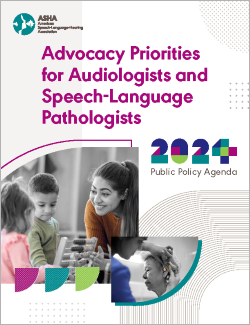2024 Advocacy Priorities for Audiologists and Speech-Language Pathologists
2024 ASHA Public Policy Agenda
The 2024 Public Policy Agenda (PPA) identifies ASHA’s top advocacy priorities for the year. Based on input shared by members, ASHA’s Government Affairs and Public Policy Board developed the priorities based on three primary areas of focus: (1) workforce; (2) payment and coverage; and (3) service delivery and access.
The PPA provides a framework for ASHA’s advocacy on behalf of its members and to allow the Association’s Government Affairs and Public Policy team to develop specific actionable objectives to make meaningful progress in these areas.
Workforce Priorities
ASHA’s ongoing advocacy efforts focus on ensuring that licensing and certification requirements are maintained in states across the U.S.; supporting the ability to practice to the fullest extent of one’s education and training; and preserving the critical role of audiologists and SLPs across work settings as well as productivity standards that support clinical excellence, ethical practice, and high quality service delivery.
For 2024, we are enhancing efforts to help address the shortage of practitioners that often contributes to high workloads, burnout, and dissatisfaction across work settings by
- expanding opportunities to grow and diversify the audiology and speech-language pathology workforce;
- promoting working environments that facilitate safe and effective service delivery;
- supporting statewide salary supplement legislation for educational audiologists and school-based SLPs who hold ASHA’s Certificate of Clinical Competence in Audiology (CCC-A and/or ASHA’s Certificate of Clinical Competence in Speech-Language Pathology (CCC-SLP) to receive additional compensation for maintaining their CCCs;
- expanding advocacy tools for school-based practitioners to self-advocate at the local and district level; and
- ensuring appropriate recognition of and support for educational audiologists and school-based SLPs and advocating for policies that facilitate efficient and effective service delivery for students with communication disorders in school settings.
Data that matters: Between 2021 to 2031, audiologists’ employment is projected to grow 10% and SLPs’ employment is expected to grow 21%.
Payment and Coverage Priorities
ASHA continuously engages with regulators and key decision makers—including public (Medicare, Medicaid) and private payers—on payment and coverage policies that reflect the value and full scope of audiology and speech-language pathology services as well as the training and expertise of our members.
For 2024, advocacy efforts address policies that limit client/patient access to care due to (1) unsustainably low payment rates for services provided by audiologists and SLPs and (2) inadequate coverage for their evaluation and treatment services. We are advocating for the following key priorities:
- Pursuing equitable funding and establishing policies to support the timely identification, evaluation, treatment, and management of speech, language, feeding/swallowing, cognitive, hearing, and balance disorders.
- Including audiologists and SLPs in emerging health care delivery systems as payment and coverage trends move from fee-for-service to value-based care.
- Expanding and permanently covering telehealth services provided by audiologists and SLPs—including, but not limited to, supporting payment parity policies and policies that explicitly incorporate the full audiology and speech-language pathology scope of practice across settings.
Data that matters: In 2023, 53% of clinicians reported accepting out-of-pocket payment from patients for telehealth services because they were not covered by insurance.
Service Delivery and Access Priorities
ASHA monitors and responds to legislative and regulatory changes that could impact licensing and certification requirements and/or the scope of practice for audiologists and SLPs as well as for audiology and speech-language pathology assistants. We also work to advance policies that create an environment conducive to efficient and effective service delivery that broadens access to critical services that audiologists and SLPs provide.
For 2024, ASHA is working to address barriers that impede the ability of audiologists and SLPs to provide robust and inclusive access to care by
- supporting anti-discriminatory policies and practices that could impact audiologists and SLPs working with people who have communication disorders;
- promoting initiatives that support screenings in hearing loss and communication disorders, collaboration and engagement of parents/caregivers, and the education of decision makers on services provided in early intervention settings; and
- operationalizing the Audiology & Speech- Language Pathology Interstate Compact (ASLP-IC) and continuing to add states participating in the ASLP-IC.
Data that matters: ASHA’s membership does not mirror the U.S. population of communities served. That reality limits the ability to train students, serve clients, and conduct research.
How to Get Involved
As a practitioner, the professional perspectives and personal stories that you share can have powerful effect. By coming together as ASHA members, leadership, and staff, we have a stronger voice and can effectively educate, inform, and influence lawmakers, policymakers, and other decision makers to take actions that benefit the professions as well as the clients, patients, and students we serve.
You can become informed and involved in a number of ways. Becoming an effective advocate is easy and takes very little time!
- Sign up for ASHA Headlines to receive the ASHA Advocate.
- Take action on ASHA’s advocacy issues by contacting your elected officials.
- Become an ASHA Grasstops Envoy.
- Learn about ASHA-PAC.
- Follow ASHA Advocacy on Facebook and Twitter.
- Develop your advocacy skills with our Guide to Being an Advocate for the Professions.












